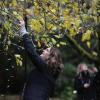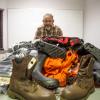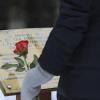November 9, 1997 - 4:00pm
Turning kids onto science and math. That's the goal of several math/science instructors who volunteer their time teaching elementary students. Twice a week, on Mondays and Fridays, students come to the campus to attend a series of workshops in a variety of subjects including math, chemistry, physics, geology and fisheries.
"Our goal is to provide students with a great opportunity to learn about the sciences and math through hands-on experiments, fun demonstrations and interesting talks from the faculty at Malaspina," said physics instructor Ray Penner, one of the driving forces behind the unique concept. "In our free workshops, we want elementary students to have a wonderful time--some of them have never done science before. They walk away from here very excited and quite a few of them comment that they'll see us again when they get to college."
The Science Centre is also proving to be extremely popular among local teachers. Last year, Malaspina faculty offered 50 workshops to 1,200 students. "We could have easily doubled that number," said Penner. "There were 10 schools on the waiting list." This year, Penner handed out brochures to schools "and within two hours we were flooded with calls," he said. "We're booked solid until the end of December."
The idea for a Science Centre was born two years ago after Penner discovered that several Malaspina instructors were doing their own science and math workshops in local elementary schools. "Most of us were doing informal workshops at our own kids' schools," he said. "So we got together to figure out if we could offer a broader selection of subjects to more students on a bigger scale."
Why would busy college instructors--many with families of their own and other commitments--take on this extra responsibility for free?
"We all feel very strongly that science and math have been neglected at the elementary education level," said Penner. "It varies dramatically with the teachers--some do a lot with their kids and some do very little. At the university-college level, we thought maybe we could help. We wanted to give the elementary students and teachers the opportunity to see people who really like science and math. Some weeks it's tiring to put in the extra volunteer hours, but in the end, we know it's worth it."
Like Penner, math instructor Dave Bigelow says volunteering in the Science Centre provides personal satisfaction.
"In addition to introducing students to science and math, the program gives them an opportunity to visit the Malaspina campus. They take two workshops and have lunch on campus," explained Bigelow. "It's an excellent opportunity for them to see their local university-college."
So how does Bigelow make math exciting and fun for his charges? "I try to dispel some of the negative attitudes around math by presenting it in an interesting and entertaining way," he said. "I tend to be very enthusiastic and try to use the kids' suggestions wherever possible. For example, we were making shapes with marshmallows and straws and a student suggested we put a marshmallow on the overhead projector and flatten it. "We discovered that you get a six-sided shape with triangles on the inside--a hexagon. The kid's loved it. Food is a wonderful motivator."
Bigelow said he often dismantles his apartment just before a workshop, looking for gadgets or familiar household objects that will help him teach kids about math.
"I might take in my bathroom mirror, food processor or an element off my stove," said Bigelow. "All these items can be used to teach math. For example, the food processor is used to spin water which makes a shape called a parabola. If you throw something into the air you get the same shape. The kids love demonstrations like this," said Bigelow.
Sandy Patrick, a chemistry instructor who also teaches at the Science Centre, said it's this kind of imagination that makes learning fun for students. "Dave is the kind of person who doesn't mind being zany in front of his students. Whatever he does, he puts his whole self into it. The kids pay attention and love learning. That's what the Science Centre is all about," said Patrick.
Tags: In the Community






